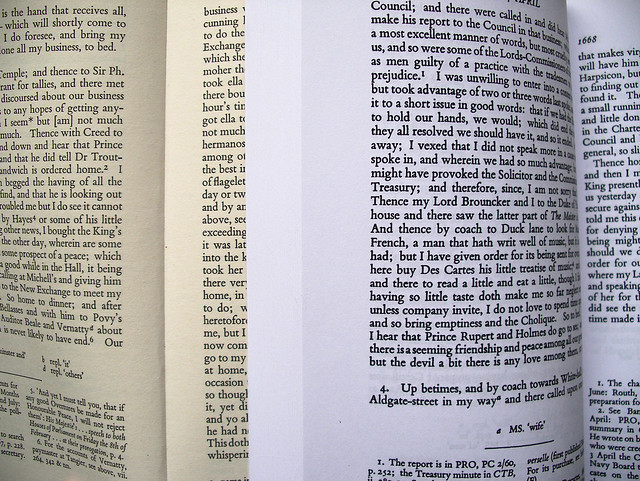Phil Gyford, who amongst many other things curates the excellent and veritable http://www.pepysdiary.com/, is rightfully annoyed at HarperCollins for pulling a bait-and-switch with their print-on-demand reissues:
The new volume, again on the right, is much whiter. It’s only when you compare standard books with really white paper that you realise they’re usually a bit yellow, slightly textured. You might think that having whiter, smoother paper is an improvement. It’s cleaner, brighter, more contrasty, but… it feels cheap. The paper is smooth and crisp, like the kind of paper you buy in reams to feed through your temperamental inkjet printer. […] Then there’s the printing. Like the cover, there’s something slightly off about it. Not only does the paper look like slick office paper, but the printing looks like it’s been churned through an office photocopier. It looks like a photocopy of the original.
… and there’s a lot more. But his point is a wider one, and bears repeating:
When publishers appear to love their own books so little, when they’re apparently happy to pass off a print-on-demand photocopy of a book as a full-price volume, it’s hard for the reader in turn to feel much love for these gradually disappearing objects.
I want to love books, but if the publisher treats them merely as interchangeable units, where the details don’t matter so long as the bits, the “content”, is conveyed as cheaply as possible, then we may be falling out of love.
I wrote about the shoddy use of POD back in 2008. Well look, the customers have noticed.
And, just as they’ve noticed this, so they’ve noticed the increased tendency of books to fall apart because they’re glued rather than stitched, and they’re starting to notice how badly-produced most ebooks are: poor OCR, bad proofing, little error correction, little or no attention to typography.
The publishing industry is happy to crow about how much it loves books, but it doesn’t often look like that to the consumer. Technologies which should be attracting more readers are being badly used to make a fast buck, and putting them off. If we lose the trust of readers, at this most critical of junctures, we will never regain it.
Photograph by Phil Gyford, licensed under Creative Commons.

Comments are closed. Feel free to email if you have something to say, or leave a trackback from your own site.